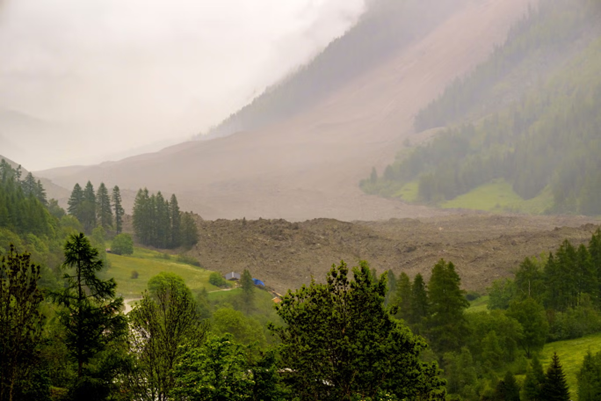Image description: An aerial shot of the alps, covered in snow. Image by Leonhard Niederwimmer / Pixabay
A glacier above the Swiss village of Blatten collapsed, triggering a massive rockslide that buried the Alpine village under ice, mud, and debris. Blatten, home to around 300 people, has been largely destroyed as a result.
Villagers were warned to evacuate earlier this month after authorities warned the nearby glacier was on the brink of collapse as cracks appeared in the ice – one of many becoming less stable as global temperature rise. The glacier collapse caused an earthquake measuring 3.1 on the Richter scale, according to seismic data.
While the immediate cause was geological, scientists have long warned that rising temperatures are weakening permafrost and accelerating glacier melt in the Alps.
Image description: A massive rock and ice avalanche in the Swiss Alps. Image by Jean-Christophe Bott /EPA-EFE/Shutterstock.
Melting of world’s glaciers accelerating
The melting of the world’s glaciers is “accelerating alarmingly” to lose the equivalent of three Olympic swimming pools each second, with Europe’s Alps and Pyrenees the worst affected. In fact, glaciers in the Alps and Pyrenees had lost about 40 per cent of their volume in less than a quarter of a century, according to a study carried out by 35 teams. In a sign of the accelerating pace, the research showed that 36 per cent more ice melted from glaciers during 2012-23 compared with the 2000-2011 period.
Additionally, a new study has found some of the world’s largest glaciers may take hundreds, if not thousands, of years to regrow if global temperatures breach 1.5ºC of warming. Unfortunately, even if global warming was to stop today, at around 1.3ºC above pre-industrial levels, the excess heat already means that the world’s glaciers will lose around 30% of their mass by 2500 – causing sea levels to rise by about nine centimetres and inundate low lying regions of the world.
While limiting warming to 1.5ºC is seen as the ‘least-bad’ option for climate change, it will still be devastating for glaciers. As most are relatively small, half of all the world’s glaciers are expected to melt completely by 2100 even if this threshold isn’t breached. It’s increasingly likely, however, that average temperature levels will rise even higher as global greenhouse gas emissions hit new heights. It’s estimated more than 70% of all glaciers will be lost if temperatures rise by 3ºC, likely causing many specialised alpine species to become extinct. Glacier collapse can lead to further community risks including freshwater shortages, accelerating sea level rise, methane release from thawing permafrost and worsening climate feedback loops.
This tragic event and new slew of studies underscore the urgency of cutting emissions sooner rather than later, as the cheapest, most effective and least damaging way to halt our planet’s rising temperatures.

